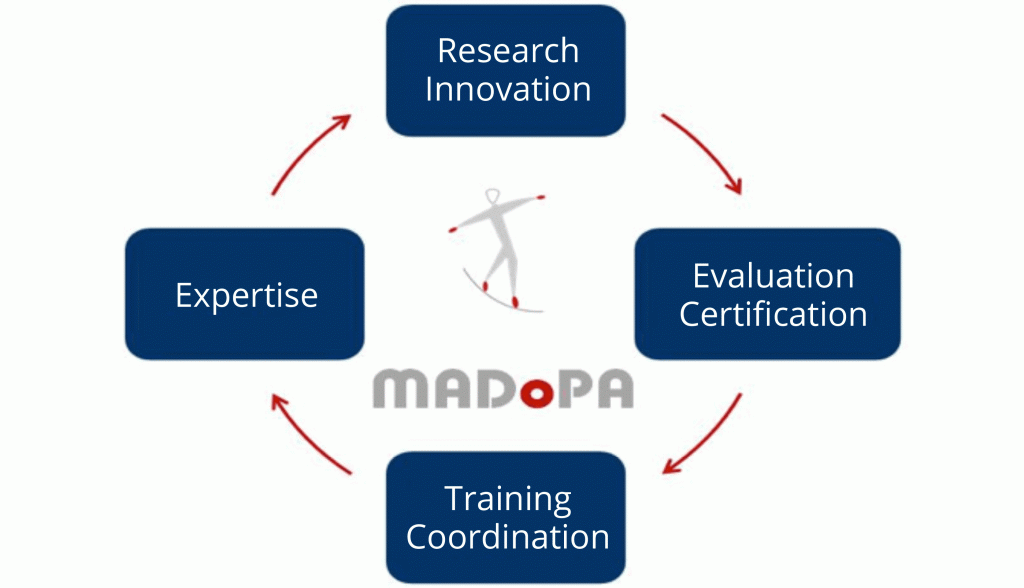The mission of MADoPA is to identify and co-construct
innovative solutions that help to maintain independent living
Our mission is to be a resource centre for innovation, evaluation, training and expertise, dedicated to identifying and co-constructing innovative solutions geared towards the detection and prevention of frailty and vulnerability, and helping elderly and disabled people to remain independent.
Two areas of complementary expertise
MADoPA’s areas of expertise lie in
- the detection and prevention of frailty and vulnerability in elderly people living at home,
- the evaluation of care and support solutions for elderly people living at home, and more widely telemedicine and telehealthcare solutions for elderly and disabled people.
1. Detection and prevention of frailty & vulnerability in elderly people living at home
- Models, indicators and instruments for measuring frailty and frailty progression/reversal processes
- Strategies and tools for detecting and monitoring frailty in elderly people
- Prevention / health promotion programmes for elderly people in pre-frail and frail states
In this area, MADoPA:
- Develops seminars and training courses to help its members and partners acquire the necessary skills for growth. Three international seminars have been run and training courses are in progress.
- Publishes literature, including a reference volume on frailty, coordinated by Hervé Michel and François Béland (University of Montreal). This volume is a compilation of contributions from top national and international experts on frailty and is to be published by EHESP press, with financial support provided by the CNAV (France’s National Pension Fund) for the translation of texts originally in English.
- Produces studies, research and strategy documents in response to requests from its members, with its expertise called upon for projects such as the SYMPAD, ASTICO, and EDF projects, etc.
- Draws upon the requisite expertise (specialised research teams) to respond, with its members, to calls for research and evaluation projects (ARPEGE, SYMPAD projects, etc.).
2. Evaluation of care and support solutions for elderly people:
multi-dimensional and innovative positioning
Evaluations of technology-based solutions for the silver economy currently use relatively segregated approaches, with evaluations of usefulness, usability and acceptability (evaluations that are essentially of a psychological and ergonomic nature) on the one hand, and evaluations based on medical and economic criteria on the other.
However, there is a growing tendency both in France and Europe-wide towards the development of comprehensive and all-round evaluation frameworks, as seen with the MAST (Model for ASsessment of Telemedicine applications) model run by the European EUnetHTA network, and with “GEMSA” , (Multidimensional Evaluation Grid for Health and Autonomy) which is in keeping with HTA but can be applied more widely to all telehealthcare solutions.
In order to satisfy the interests of all parties involved (financers, care and service providers, industrial players, researchers and users), MADoPA has opted for an all-round and innovative approach to evaluation. This comprehensive approach evaluates not only technical, medical and economic factors, but also the organisational, policy and ethical considerations for and against rollout of the proposed solutions.
It also paves the way for further study of the conditions necessary for acceptance and use of the proposed solution. If feedback on acceptance and use by final users is to be as relevant and discerning as possible, evaluation should not be based solely on psychological and ergonomic tests performed by elderly users. It also needs, by means of a social and ethnographic approach, to take into account the relationships driven by the context of home care and services, which develop between elderly people, their family and friends, and care professionals working in the home environment.
Comprehensive and innovative methods
MADoPA applies its expertise and a state-of-the-art methodology appropriate to the evaluation of care and support solutions for elderly people living at home, people with chronic conditions and disabled people:
- • Evaluation of the acceptance and use and acceptability of solutions: how useful is the solution and what added value does it bring from the perspective of the different users? What new restrictions and opportunities does it bring about for elderly users, particularly in the assistance and care relationship between the elderly person, informal carers and professional home care workers?
- • All-round evaluation: comprehensive evaluation, with the different users and all parties involved in the project, of the technical, organisational, economic, ethical, acceptance and use and public healthcare conditions necessary for rollout of technology-based solutions for use by healthcare professionals and/or elderly people and their friends and relatives.
Evaluated solutions and Population group concerned
MADoPA is currently applying these evaluation approaches to seven European, national and regional projects, concerning two types of target population group:
- Solutions for elderly people living at home or people with chronic conditions:
- Care robot for elderly people (European project: ACCOMPANY, FP7)
- Telepresence robot (European project: TERESA, FP7)
- Automated medical care at home: home chemotherapy pump and GPS bracelet for people suffering from Alzheimer’s disease (FUI-funded: PICADo project)
- Smart textiles for people with chronic conditions (IFTH project partially funded by the Champagne-Ardenne Regional Council)
- Personal Assistant, (European project: Paelife, AAL-2)
- • Solutions for professional healthcare and/or home care workers
- Pharmacy-based monitoring system for patients with chronic conditions (SYMPAD project, e-health 2)
- Technology-based pack for detecting frailty (ARPEGE project, funded by the Champagne-Ardenne Regional Council and CARSAT Nord-Est, the North-East branch of France’s Pensions and Occupational Health Fund) for use by professional staff employed by CARSAT, general practitioners, geriatricians and nurses.
